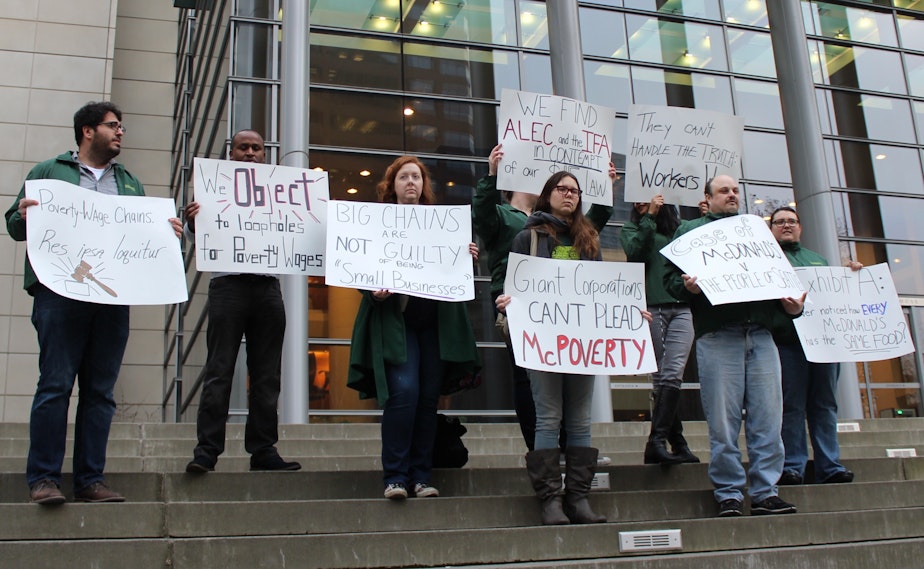Attorneys Debate Constitutionality of Seattle's $15 Minimum Wage Law

Lawyers for the International Franchise Association and five local franchisees were in court Tuesday asking that portions of Seattle’s new $15-an-hour minimum wage law be barred from taking effect.
The law, which was passed in 2014, phases in a $15 an hour minimum wage over a period of years.
Big employers will have to reach $15 by 2017, or 2018 if they provide medical benefits. Small businesses will have a longer phase in and will have to reach $15 between 2019 and 2021.
Franchisees are typically small, locally owned businesses, but the new law considers them big businesses because of their connections to larger national networks. They range from big national chains like McDonald's to small housecleaning companies like Molly Maid.
“I think anyone can figure out that is a blatant competitive disadvantage and it’s discriminatory and that is what we are basing our case on,” said Steve Caldeira, President of the International Franchise Association.
Sponsored
The lead attorney for the IFA is Paul Clement, a former U.S. solicitor general who led the 2012 Supreme Court challenge to the Affordable Care Act.
Clement argued the minimum-wage law as it applies to franchisees violates the Commerce Clause of the Constitution, which prohibits local laws that discriminate against interstate commerce.
The IFA also claims the law violates the Equal Protection Clause of the Constitution. In his oral arguments, Clement widely quoted emails by venture capitalist Nick Hanauer, who disparaged franchises as “not that beneficial to our city.” Hanauer was on Mayor Ed Murray’s Income Inequality Advisory Committee, and is widely believed to have been a major force behind the law.
Arguing for the city, Assistant City Attorney Greg Narver said the law doesn’t discriminate, it merely draws a distinction between small and large businesses in terms of how capable they are of paying a higher wage.
Hanauer's emails aren't relevant, Narver argued, because they came from a private citizen and not a policy maker.
Sponsored
Narver said the purpose of the law was to aggressively address the problem of income inequality.
Before the hearing, a small group of demonstrators stood outside the U.S. District Court building holding signs defending the minimum-wage law.
Jason Scott Harvey, an employee of Burger King, said fast food franchises should not have extra time to raise their wages.
“They are making money hand over fist,” Harvey said. “If they have enough money to pay for this kind of lawyers, they should have enough money to pay for the little bit we have been asking for just so we can put food on the table.”
The IFA is asking for an injunction that would prevent the faster phase-in of the $15-an-hour wage from applying to franchises until the lawsuit can be heard in court. The first phase of the new wage, $11 for big businesses and $10-$11 for small businesses, will take effect on April 1.
Sponsored
U.S. District Judge Richard Jones says he will try to rule on the preliminary injunction by next Tuesday.

